#William Melmoth
Photo
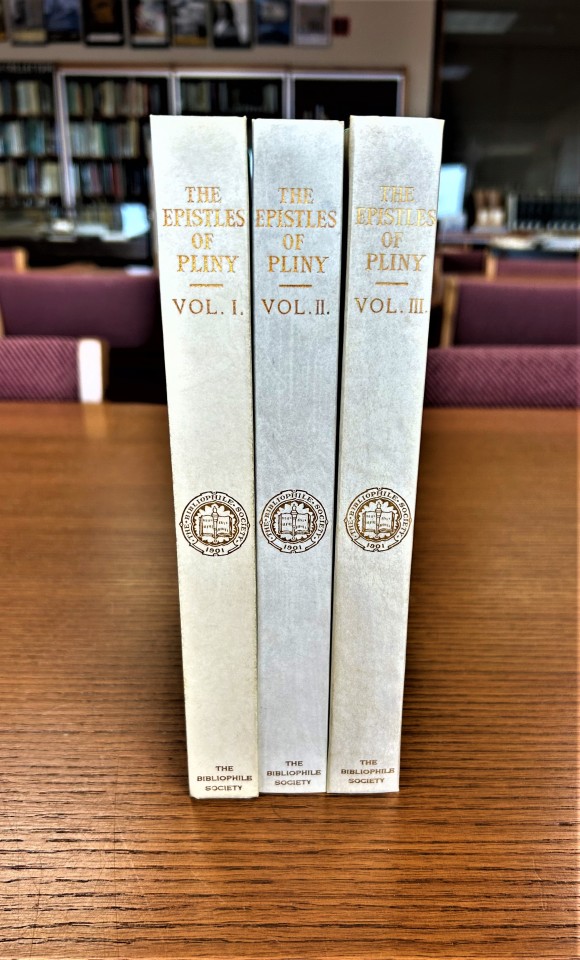
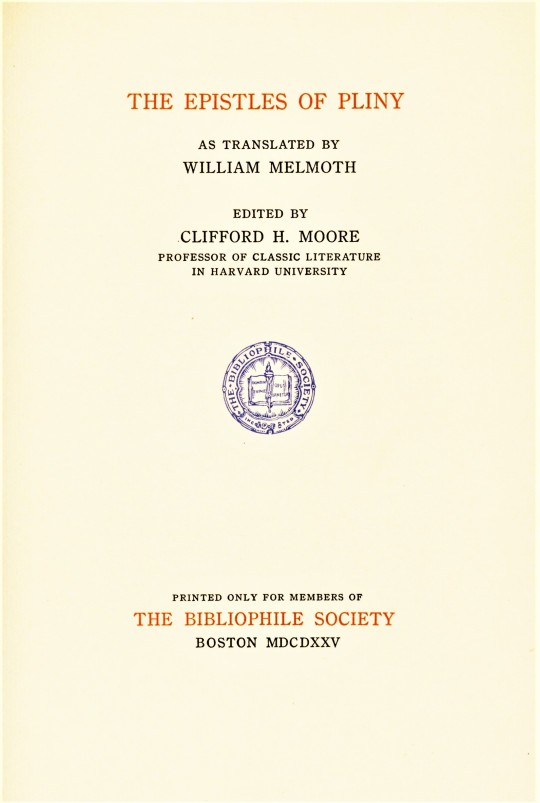
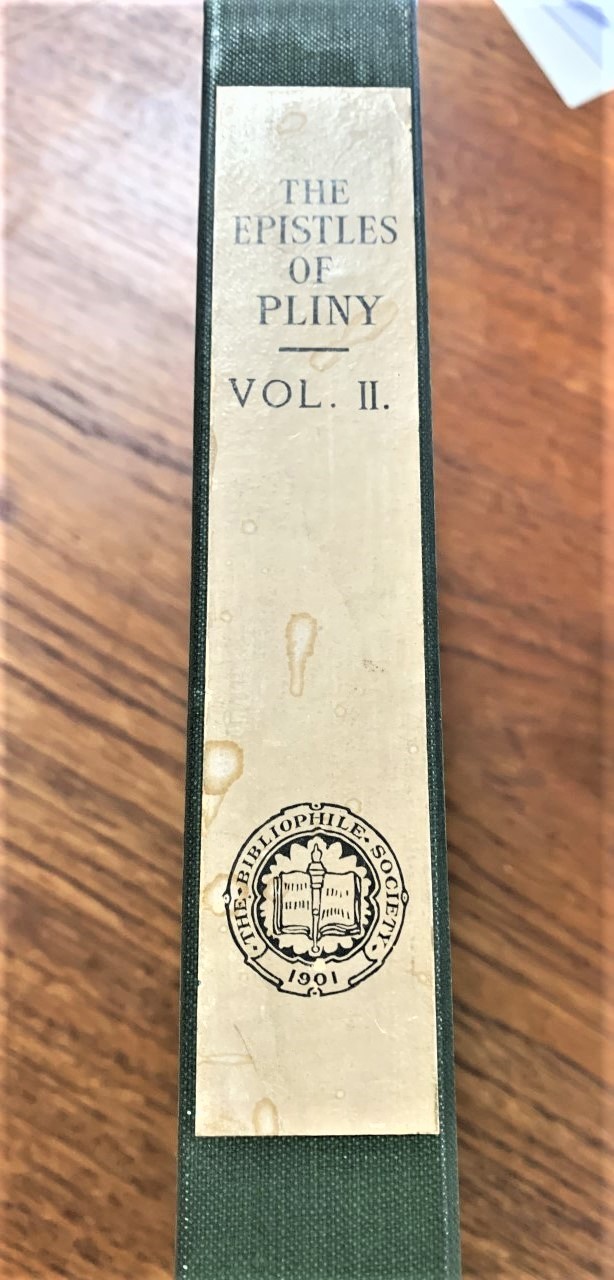
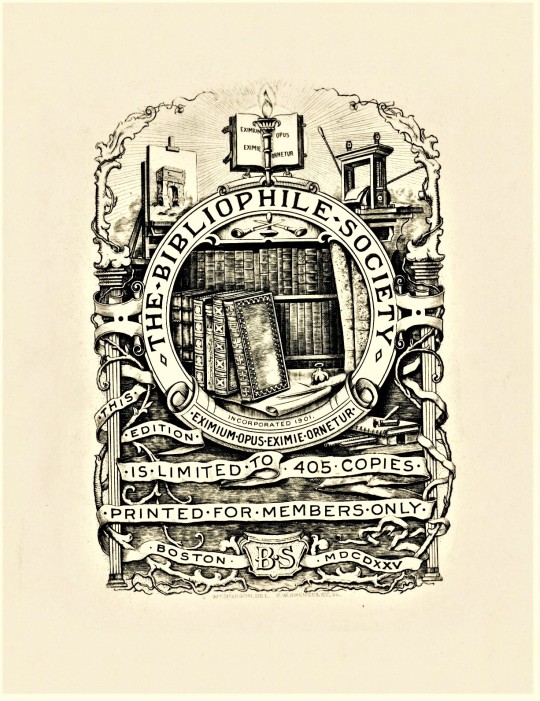
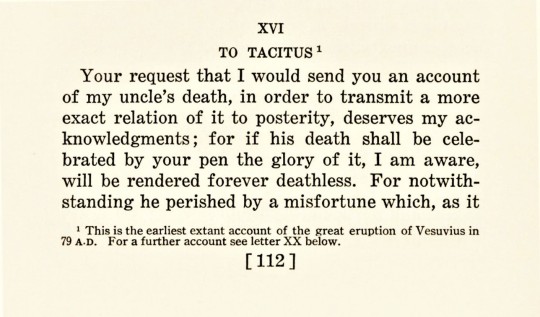
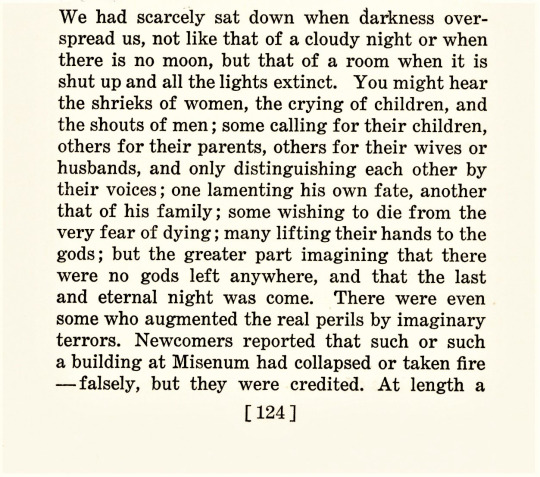
The Eruption of Mt. Vesuvius
The Eruption of Mt. Vesuvius in 79 CE remains one of the deadliest natural disasters in recorded history. Not only did the volcano destroy the economically powerful city of Pompeii, but Herculaneum, Oplontis, Stabiae were also buried and thus lost to the Roman Empire. The number of victims is unknown, but given the size of the four cities, estimates have reached over 18,000 individuals.
Today only one first-hand account of this horrific event survives in two letters from Pliny the Younger to the Roman historian Tacitus. They are preserved as letters 6.16 and 6.20 in the collected Epistles of Pliny. Among our holdings of the works of Pliny is this 3-volume set of the Epistles with William Melmoth’s 18th-century translation edited by Clifford Herschel Moore, and printed by the Harvard University Press in an edition of 405 copies for members of The Bibliophile Society, Boston, in 1925.
While the term ‘volcanic eruption’ evokes scenes of lava and fire, the reality is much more frightening. Curiously, there is no word for volcano in the Latin language. While ancient Romans were aware of the destructive power of volcanoes, there’s some debate about whether they were aware that Vesuvius was a volcano before its eruption. Signs of the eruption began back in 62CE with a great earthquake that caused much of the city to collapse. Smaller earthquakes continued over the next 15 years until one was accompanied by the rise of a column of smoke from Mt. Vesuvius in October 79 CE.
The hot gases that made up the column of smoke began to cool, darkening the sky, and not long after a rain of pumice began to fall, and after 15 hours ceilings began to collapse. Nevertheless, many residents chose to take shelter rather than flee. At 4am the first 500C pyroclastic surge barred down the volcano, burying Herculaneum. Six more of these surges occurred before the end of the eruption, destroying Pompeii, Oplontis, and Stabiae.
The 17-year old Pliny was in the port town of Misenum across the Bay of Naples from the volcano at the time. Pliny’s uncle, Pliny the Elder, commander of the Roman fleet at Misenum, launched a rescue mission and went himself to the rescue of a personal friend. The elder Pliny did not survive the attempt. In Pliny the Younger’s first letter to Tacitus, he relates what he could discover from witnesses of his uncle's experiences. In a second letter, he details his own observations after the departure of his uncle.
Mt. Vesuvius is still active and according to volcanologists, erupts about every 2000 years, which would be right about now. Who will be our next Pliny the Younger?
Our copy of The Epistles of Pliny is another gift from our friend and benefactor Jerry Buff.
View more of my Classics posts.
– LauraJean, Special Collections Undergraduate Classics Intern
#Classics#classical history#Roman History#Mt. Vesuvius#Eruption of Mt. Vesuvius#Pliny the Younger#Epistles of Pliny the Younger#Pliny the Elder#Tacitus#William Melmoth#Clifford Herschel Moore#Harvard University Press#The Bibliophile Society#volcanic eruptions#Pompeii#herculaneum#Oplontis#Stabiae#Jerry Buff#LauraJean
90 notes
·
View notes
Text
A List of Works Influencing and Referenced by IWTV Season 1
Works Directly Referenced
Marriage in a Free Society by Edward Carpenter
A Doll’s House by Henrik Ibsen
Madame Bovary by Gustave Flaubert
Cheri by Collete
A Streetcar Named Desire by Tennessee Williams
La Nausee by Jean-Paul Sartre (credit to @demonicdomarmand )
Complete Poetry of Emily Dickinson edited by Thomas H.
Johnson*
The Book of Abramelin the Mage
Don Pasquale by Gaetano Donizetti with libretto by Giovanni Ruffini
Iolanta by Pyotr Tchaikovsky with libretto by Modest Tchaikovsky
Pelleas et Melisande by Claude Debussy
Epigraphes Antiques by Claude Debussy
Bram Stoker’s Dracula (1992)
Nosferatu (1922)
Kansas City Stomp by Jelly Roll Morton
Wolverine Blues by Jelly Roll Morton
Works Cited by the Writer’s Room as Influences
Bourbon Street: A History by Richard Campanella (as it hardly mentions Storyville I think interested parties would be better served by additional titles if they want a complete history of New Orleans)
Invisible Cities by Italo Calvino (This was also adapted into an award winning opera)
poetry by Charles Simic (possibly A Wedding in Hell?)
poetry by Mark Strand (possibly Dark Harbour?)
Works IWTV may be in conversation with (This is the most open to criticism and additions)
The Picture of Dorian Gray by Oscar Wilde, uncensored (There are two very different versions of this which exist today, as Harvard Press republished the unedited original with permission from the Wilde family.)
Absalom, Absalom! by William Faulkner
Warsan Shire for Beyoncé’s Lemonade
Faust: A Tragedy by Johann Wolfgang von Goethe
Melmoth the Wanderer by Charles Maturin
Wuthering Heights by Emily Bronte
La Morte Amoreuse by Theophile Gautier
Carmilla by Sheridan LeFanu
Maurice by E.M. Forster
Giovanni’s Room by James Baldwin
Sailing to Byzantium by Yeats
The Circus Animal's Desertion by Yeats
The Second Coming by Yeats
Invisible Man by Ralph Ellison (credit to @johnlockdynamic )
1984 by George Orwell (credit to @savage-garden-nights for picking this up)
The Yellow Wallpaper by Charlotte Perkins Gilman
A Rose for Emily by William Faulkner
Gone With the Wind film (1939)
Hannibal (2013)
*if collected or in translation most of the best editions today would not have been available to the characters pre-1940. It’s possible Louis is meant to have read them in their original French in some cases, but it would provide for a different experience. Lydia Davis’ Madame Bovary, for example, attempts to replicate this.
** I've tagged and linked relevant excerpts under quote series as I've been working my way through the list.
part 2 here
#Iwtv#Its entirely possible these were not in mind at all but given their fame and influence in general its not impossible#there's also a LOT of gothic novels written before Interview with the Vampire (1976) that share many qualities such as unreliable narrators#but I wanted to make sure I was choosing direct inspiration rather than cousins#Interview with the vampire#iwtv season 1#Quote series
66 notes
·
View notes
Text
anne rice, pseudointellectual extraordinaire, managed to squeeze into the tale of the body thief references to: "sailing to byzantium" and "the dolls" by william butler yeats, a tale of two cities, anna karenina, the postman always rings twice, lolita, "the tyger" by william blake, a tree grows in brooklyn, "the thing on the doorstep" by h.p. lovecraft, "eyes of the mummy" by robert bloch, goethe's faust, jeffrey burton russell, mircea eliade, john milton, marcus aurelius, hart crane, george bernard shaw, diogenes, thomas aquinas, jacques maritain, pierre teilhard de chardin, dostoyevsky, albert camus, and john keats. at one point lestat uses the alias "sebastian melmoth," which was a pseudonym used by oscar wilde, itself a reference to melmoth the wanderer by charles maturin. later lestat goes by the last name "wilde." he also references othello and at one point asserts that he is "not time's fool." the alias "sheridan blackwood" might be a reference to sheridan dufferin given rice's interest in art, and i assume she got "alexander stoker" from bram. the movies that appear or are referenced are suspicion (1941), vice versa (1988), all of me (1984), the company of wolves (1984), beauty and the beast (1946), the dead (1987), it's a wonderful life (1946), and body and soul (1947). characters see or reference art by rembrandt (specifically the syndics of the draper's guild), picasso (three separate times), willem de kooning, jasper johns, andy warhol, monet, and edward hopper. there's also a reference to the actor rutger hauer. uhhh i think that's it but holler if you caught one i didn't
#iwtv#vampire posting#i'm sorry i don't know why i did this. there's no use for this. i just love making lists#the show is really keeping in the spirit by making the paintings in the background/so many of the books identifiable#interesting that all the movies are either from the 80s (the last 10yrs relative to when the book was written) or the 40s#(anne rice's early childhood)
31 notes
·
View notes
Text
#polls#gothic lit#the mysteries of udolpho#christabel#the last man#vathek#the castle of otranto#melmoth the wanderer#clermont#zofloya#the monk#the bride of lammermoor
59 notes
·
View notes
Text
“Cada acierto nos trae un enemigo. Para ser popular hay que ser mediocre”
Oscar Wilde
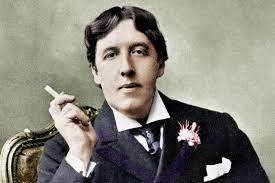
Fue un escritor, poeta y dramaturgo de origen irlandés nacido en Dublín en octubre de 1854.
Wilde es considerado uno de los dramaturgos más destacados del Londres victoriano tardío.
Fue el segundo de tres hijos del matrimonio conformado por Sir William Wide, un importante cirujano especialista en otología y oftalmología de Irlanda, y además un destacado arqueólogo y estadístico, y de Jane Frances Agnes Elgee, poetiza partidaria del nacionalismo irlandés. Ambos, destacados miembros de la sociedad angloirlandesa de Dublín.
Su educación transcurrió en casa hasta la edad de 9 años, demostrando una facilidad especial para el francés y el alemán, además de ser poseedor de una inteligencia notable. En 1871 ingresó al Trinity College de Dublín en donde estudió a los clásicos durante 3 años. Fue allí en donde conocería a su tutor quien inspiró su interés por la literatura griega.
En 1874, ingresó en el Magdalen College de Oxford, continuando sus estudios hasta 1878, en donde se licenció con reconocimientos en estudios clásicos.
En 1881 a los 27 años, publicó su primer libro con trabajos poéticos el cual recibió buena aceptación.
En 1884, contrajo matrimonio con Constance Lloyd quien le dió dos hijos.
En 1878 abandona su país para pasar los siguientes seis años en Paris, Londres y los Estados Unidos dando conferencias.
Wilde recibió una gran influencia de escritores como John Ruskin y Walter Pater, además de adherirse al movimiento estético o esteticismo, basado en la doctrina de que el arte sirve para beneficio de la exaltación de la belleza, en donde Wilde fue uno de sus principales representantes en Gran Bretaña.
En 1895, cuando se encontraba en la cima de su carrera, Wilde protagonizó uno de los escándalos mas sonados de su tiempo al ser acusado de “sodomía y de grave indecencia”, por el padre de quien fuera su amigo lord Alfred Douglas, siendo condenado a dos años de trabajos forzados.
La sentencia a Wilde que buscaba ser ejemplificadora, tuvo mucha repercusión y propició el recrudecimiento de la intolerancia sexual en Gran Bretaña y en todo Europa.
Desengañado con la sociedad inglesa y arruinado material y espiritualmente, abandonó la prisión en mayo de 1897, retomando su amistad con Douglas ante la desaprobación de ambas familias, en donde la esposa de Wilde, rehuso volver a encontrarse con el y le prohibió ver a sus hijos. Wilde y Douglas vivieron algunos meses juntos cerca de Nápoles, hasta que la amenaza de sus respectivas familias de cortarles los fondos terminó por separarlos.
Wilde pasó los últimos años de su vida en Paris, bajo el nombre falso de Sebastián Melmoth, muriendo a la edad de 46 años en septiembre de 1900.
Fuentes: Wikipedia y biografiasyvidas.com
#citas de reflexion#citas de la vida#frases de reflexion#escritores#frases de escritores#oscar wilde#irlanda#citas de escritores#dublin
28 notes
·
View notes
Photo






A Nest of Quiet: A Notebook by Anna Kamienska // The First Mourning, 1888, by William-Adolphe Bouguereau (1825-1905) // The Handsmaid’s Tale by Margaret Atwood // Scorfega by Tracey Emin // A Nest of Quiet // Our Lady of The Blind Gate by Emil Melmoth
10 notes
·
View notes
Text
Books Read in 2022
rereads in italics, favorites in bold
1. Harry Potter and the Chamber of Secrets by J K Rowling
2. Harry Potter and the Prisoner of Azkaban by J K Rowling
3. Boxers by Gene Luen Yang
4. Saints by Gene Luen Yang
5. Harry Potter and the Goblet of Fire by J K Rowling
6. Topaz by Leon Uris
7. Politics and the English Language by George Orwell
8. The Cherry Orchard by Anton Chekhov
9. Harry Potter and the Order of the Phoenix by J K Rowling
10. A Memory Called Empire by Arkady Martine
11. All Systems Red by Martha Wells
12. Apostles of Disunion: Southern Secession Commissioners and the Causes of the Civil War by Charles B Dew
13. The Three Sisters by Anton Chekhov
14. Harry Potter and the Half-Blood Prince by J K Rowling
15. The Burial at Thebes: A Version of Sophocles’ Antigone by Seamus Heaney
16. The Seven and a Half Deaths of Evelyn Hardcastle by Stuart Turton
17. Hidden Mercy: Aids, Catholics, and the Untold Stories of Compassion in the Face of Fear by Michael J O’Loughlin
18. Artificial Condition by Martha Wells
19. A Slave No More: Two Men Who Escaped to Freedom, Including Their Own Narratives of Emancipation by David W Blight
20. Rogue Protocol by Martha Wells
21. Simon vs. The Homo Sapiens Agenda by Becky Albertalli
22. Confederate Reckoning: Power and Politics in the Civil War South by Stephanie McCurry
23. Harry Potter and the Deathly Hallows by J K Rowling
24. Desolation Island by Patrick O’Brian
25. Faith Beyond Resentment: Fragments Catholic and Gay by James Alison
26. Richard III by William Shakespeare
27. Shadow and Bone by Leigh Bardugo
28. An Old-Fashioned Girl by Louisa May Alcott
29. A Long Day’s Journey Into Night by Eugene O’Neill
30. The Fortunes of War by Patrick O’Brian
31. The Invisible Life of Addie LaRue by V E Schwab
32. Siege and Storm by Leigh Bardugo
33. The PIllowman by Martin McDonagh
34. Free Thought and Official Propaganda by Bertrand Russell
35. The Crocodile on the Sandbank by Elizabeth Peters
36. The Open Society and its Enemies, Volume One: Plato by Karl Popper
37. The Problem of Pain by C S Lewis
38. The Open Society and its Enemies, Volume Two: Hegel and Marx by Karl Popper
39. Gates of Fire by Steven Pressfield
40. Albion’s Seed: Four British Folkways in America by David Hackett Fischer
41. Rosencrantz and Guildenstern are Dead by Tom Stoppard
42. On Earth We’re Briefly Gorgeous by Ocean Vuong
43. Ruin and Rising by Leigh Bardugo
44. Persuasion by Jane Austen
45. Dead Cert by Dick Francis
46. Art by Yasmin Reza
47. His Majesty’s Dragon by Naomi Novik
48. Guns, Germs, and Steel by Jared Diamond
49. The Constitution of Liberty by Friedrich A Hayek
50. The Brothers Karamazov by Fyodor Dostoevsky
51. Exit Strategy by Martha Wells
52. This is How You Lose the Time War by Amal El-Mohtar and Max Gladstone
53. Blackout by Simon Scarrow
54. The Thief by Megan Whalen Turner
55. The King of Attolia by Megan Whalen Turner
56. Six of Crows by Leigh Bardugo
57. The Government Inspector by Nikolai Gogol
58. This Hallowed Ground: The Story of the Union Side of the Civil War by Bruce Catton
59. The Happy Prince and Other Tales by Oscar Wilde
60. Recitatif by Toni Morrison
61. Against All Odds: A True Story of Ultimate Courage and Survival in World War II by Alex Kershaw
62. I Kissed Shara Wheeler by Casey McQuiston
63. How to Train Your Dragon by Cressida Cowell
64. The Trial by Franz Kafka
65. To the Finland Station by Edmund Wilson
66. The City of Brass by S A Chakraborty
67. Niccolo Rising by Dorothy Dunnett
68. Common Sense by Thomas Paine
69. The Crisis by Thomas Paine
70. Dracula by Bram Stoker
71. The Soviet Experiment: Russia, the USSR, and the Successor States by Ronald Grigor Suny
72. Ben-Hur: A Tale of the Christ by Lew Wallace
73. One Last Stop by Casey McQuiston
74. Angels in America by Tony Kushner
75. Melmoth by Sarah Perry
76. Outlander by Diana Gabaldon
77. How to Be a Pirate by Cressida Cowell
78. The Poverty of Historicism by Karl Popper
79. The Shepherd by Frederick Forsyth
80. Children of Blood and Bone by Tomi Adeyemi
81. The Birth of Tragedy by Friedrich Nietzsche
82. Cue for Treason by Geoffrey Trease
#I love being pretentious for absolutely no-one <3#this is for ME#to be remembered#this was the year I got interested in the austrians#and also audiobooks
4 notes
·
View notes
Text
My favorite books of all time, in no particular order*:
Anna Karenina
Melmoth the Wanderer
The Woman in White
Crime and Punishment
The Picture of Dorian Gray
The Master and Margarita
Good Omens
Honorable mention to every book by Cinda Williams Chima, the best YA author I’ve ever read and one who really deserves more attention. Check her out please, I’m talking well-developed characters, engaging plots that make sense, solid world-building, and books that are just really well-written.
I really cannot recommend these enough if you haven’t read them <3
* Except for Anna Karenina. She reigns unchallenged as my all-time favorite. Genuinely no other book comes close.
10 notes
·
View notes
Text

El 16 de octubre de 1854, en Dublin, Irlanda, nacía uno de los dramaturgos más respetados de la historia de la literatura, ese día llegaba al mundo Oscar Wilde. Como en esa época Irlanda pertenecía a la Reino Unido, Oscar Fingal O'Flahertie Wills Wilde era considerado británico. Su padre William Wilde era cirujano, oftalmólogo y arqueólogo, por su parte, su madre Jane Frances Agnes Elgee, era poetiza y abierta partidaria del nacionalismo irlandés. Oscar creció en ese ambiente de intelectuales y demostró estar a la altura de las expectativas, en su adolescencia ya hablaba francés y alemán. Hasta los 17 años estudió en la Port Royal School de Enniskillen para terminar su instrucción en el Trinity College donde se familiarizó con los clásicos de la literatura universal. Mahaffy, su tutor, lo introdujo en el mundo de la literatura griega sobre la que escribió un artículo que le valió la medalla de oro de Berkeley. Esto lo hizo merecedor de una beca que le permitió continuar sus estudios en el prestigioso Magdalen College, de Oxford. Su poema 'Ravenna' lo hizo merecedor del 'Oxford Newdigate Prize', escalón fundamental para graduarse con el mejor promedio como Bachelor of Arts. Cuando su pareja Florence Balcombe lo abandonó para casarse con Bram Stoker, autor de Drácula, Oscar decidió abandonar Irlanda para limpiar su alma de dolor. Lo hizo de inmediato cuando conoció y se enamoró de Constance Lloyd, con quien tuvo a Cyril y Vyvyan Wilde. De manera rotunda se presentó como un 'esteticista' cuando presento 'El retrato de Dorian Grey', una de sus obras mas célebres. Se convirtió en un sagaz acuñador de frases cortas y aforismos ingeniosos, al llegar a los puertos, cuando le preguntaban si traía algo, el respondía 'Solo mi mal genio'. En la cima de su carrera escandalizó a la pacata alta sociedad inglesa cuando tuvo un affaire con lord Alfred Douglas, hecho por el cual fue acusado de sodomía y enviado a la cárcel. Al ser liberado en 1897, estaba arruinado económicamente y desilusionado con la sociedad londinense por lo que abandonó el país rumbo a Francia. Wilde pasó el resto de su vida en París donde abrazó el catolicismo y vivió con el nombre falso de Sebastián Melmoth. George Bernard Shaw dijo sobre este exilio, 'No debe olvidarse que, a pesar de que por cultura Wilde era un ciudadano de todas las capitales civilizadas, de raíz era un irlandés muy irlandés y, como tal, un extranjero en todas partes menos en Irlanda'. Desde su nuevo hogar publica 'La balada de la cárcel de Reading' escrita durante su detención. En octubre de 1900 es operado de una otitis aguda de la cual no se recuperó totalmente, finalmente el 30 de noviembre muere a causa de un ataque de Meningitis a los 46 años. Luego de su muerte se edita 'De Profundis' que sumada a sus 'La importancia de llamarse Ernesto', 'Requiescat', 'El príncipe feliz' y 'El fantasma de Canterville' lo ubican entre los mas respetados escritores de todos los tiempos.
0 notes
Photo



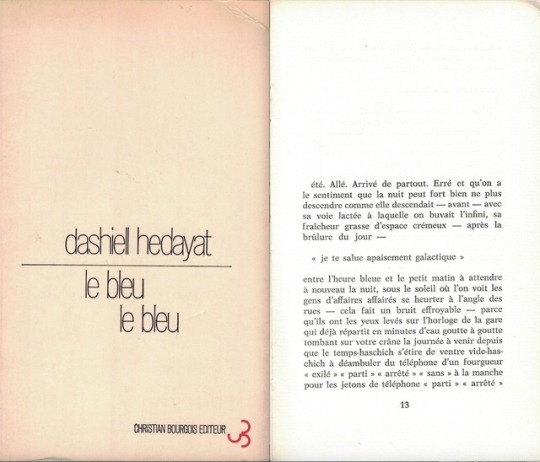
POST-SCRIPTUM 808
DASHIELL HEDAYAT, Obsolete (1971)
Sous la pochette rose gaufrée illustrée se cache une sorte de croisement musical entre La Machine molle de Burroughs et À rebours d’Huysmans, mâtinée de Manifeste électrique aux paupières de jupe. Inspiré par un auteur de polar américain et un poète perse suicidaire, le nom du signataire s’impose d’emblée une invitation au voyage, alors qu’il s’appelle en fait Daniel Théron.
Peu de temps avant la réalisation d’Obsolète, enregistré au printemps 1971 bien que déjà composé dès 1969, sous le patronyme de Melmoth cette fois (du nom d’un roman gothique irlandais fait d’analepses mises en abyme), Dashiell Hedayat enregistre La Devanture des ivresses, disque dépravé au succès d’estime dans les milieux branchés, curieusement auréolé du grand prix de l’Académie Charles Cros.
Moins sombre, Obsolète fonctionne par associations libres inspirées du cut-up tel que mis au point par William S. Burroughs et Brion Gysin, ce qui en fait également une sorte d’équivalent musical du culte Rose Poussière de l’écrivain Jean-Jacques Schuhl, source d’inspiration des dandys Yves Adrien, Alain Pacadis et Patrick Eudeline. On y retrouve la même obsession pour les paradis artificiels que chez le poète électrique Michel Bulteau (du groupe Mahogany Brain pendant un temps) et le « dernier des immobiles » Matthieu Messagier, des ambiances sonores proches de Soft Machine habillant un flow (presque toujours) parlé, dont le timbre envoute et agit tel un narcoleptique.
Dans cet univers fantasmatique subtilement désuet, Dashiell Hedayat parait littéralement jouir de sa décadence en se perdant volontairement dans les méandres oniriques d’un rêve paranoïaque et drogué, comme en témoignent des images d’entretien captées pour la télévision française et l’émission Discorama de Denise Glaser. « C’est tout de suite un piège, « Qui êtes-vous ? » On n’est pas vraiment quelqu’un. Personne n’a vraiment une identité. Je suis plutôt sur le voyage de la schizophrénie… Alors, tout de suite, « Qui êtes-vous ? » coupe toute conversation possible. On n’est pas seulement ce qu’on fait, Dieu merci ! »
Dans Obsolète, Dashiell Hedayat évoque le speed (« horse power »), le sexe à n’en plus finir (« entre ses seins et ses cuisses, je sombre »), et un drôle de trip (« les chats dans l’escalier »). Soutenu comme tous les autres morceaux par une des meilleures formations alignées par Gong (Daevid Allen, Gilli Smyth, Didier Malherbe, Christian Tritsch, Pip Pyle), Chrysler Rose devient un hit underground (mérité) régulièrement repris dans les anthologies dignes de ce nom consacrées aux années 1970 françaises.
Malheureusement, Dashiell Hedayat n’enregistre plus après ce disque sorti par le label du mécène Chantal Darcy, elle-même financée par le marchand d’art Aimé Maeght et conseillée par le critique visionnaire Daniel Caux, enseigne également éditrice (entre autres) de La Monte Young et Charlemagne Palestine. Après avoir traduit Tarantula de Bob Dylan, il se consacre entièrement à la littérature, d’abord expérimentale, sur les excellents Selva Oscura, Le Bleu, le bleu, Jeux d’intérieur au bord de l’océan et Le Livre des morts-vivants, variations convaincantes des univers de William S. Burroughs et Claude Pélieu ; puis commerciale, sous le pseudonyme (un de plus) de Jack-Alain Léger ; et enfin controversée, sous l’identité de Paul Smaïl, auteur d’Ali le magnifique et Tartuffe fait ramadan.
« Qui êtes-vous ? » lui demande dans une belle intuition la douce et stylée Denise Glaser en 1969… Disons qu’on n’en sait guère plus aujourd’hui qu’à l’époque, sinon que… « Tout est si vague… Je ne sais même plus si pense… J’étais à contempler les anneaux de Saturne… Les os friables de la came… J’étais le singe du travelo... Mon cul comme une plaie ouverte… Mon nez où s’engouffraient les autos comme dans un tunnel… Des étoiles qui tournaient partout… » On est tous défoncés.
( Yves Adrien, par là )
#dashiell hedayat#melmoth#gong#william burroughs#daevid allen#bob dylan#philippe robert#agitation frite 2#lenka lente#agitation frite#chantal darcy#shandar#maeght#gilli smyth#pip pyle#christian tritsch#brion gysin#soft machine#yves adrien#alain pacadis#patrick eudeline#michel bulteau#matthieu messagier#jean-jacques schuhl#joris-karl huysmans#mahogany brain#post-scriptum#merzbo derek#lediteursingulier
38 notes
·
View notes
Video
youtube
An Inverted Audio premiere of our track The Engineering of Consent, taken from the upcoming album ‘The Dynamics of Vanity’. Pre-order from Artificial Dance now.
#artificial dance#sebastian melmoth#new album#engineering of consent#gardyloo spew#william burroughs#inverted audio#premiere#the dynamics of vanity
0 notes
Text
reading list - gothic
CLICK HERE TO ACCESS MY OTHER READING LISTS.
✵ ACTIVELY UPDATING ✵
☐ ALDERMAN, Naomi – The Lessons
☐ ATWOOD, Margaret – Lady Oracle
☐ AUSTEN, Jane – Northanger Abbey
☐ AZEVEDO, Álvares de – Noite na Taverna
☐ BECKFORD, William Thomas – Vathek
☐ BIERCE, Ambrose – The Death of Halpin Frayser
☐ BIERCE, Ambrose – The Spook House
☐ BLACKWELL, Anastasia – The House on Black Lake
☐ BLACKWOOD, Algernon – The Listener and Other Stories
☐ BRONTË, Charlotte – Jane Eyre
☐ BRONTË, Charlotte – Villette
☐ BRONTË, Emily – Wuthering Heights
☐ BROWN, Charles Brockden – Wieland
☐ BROWN, Charles Brockden – Ormond
☐ CAPOTE, Truman – Other Voices, Other Rooms
☐ CARTER, Angela – The Bloody Chamber
☐ CATHER, Willa – My Ántonia
☐ CAZOTTE, Jacques – Le Diable amoureux
☐ CHAMBERS, Robert W. – The King in Yellow
☐ DANFORTH, Emily M. – Plain Bad Heroines
☐ DANIELEWSKI, Mark Z. – House of Leaves
☐ DICKENS, Charles – Oliver Twist
☐ DICKENS, Charles – Bleak House
☐ DICKENS, Charles – Great Expectations
☐ DICKENS, Charles – The Mystery of Edwin Drood
☐ DOSTOYEVSKY, Fyodor Mikhailovich – The Double
☐ DOSTOYEVSKY, Fyodor Mikhailovich – The Landlady
☐ DOSTOYEVSKY, Fyodor Mikhailovich – Bobok
☐ DOSTOYEVSKY, Fyodor Mikhailovich – The Brothers Karamazov
☐ DOYLE, Sir Arthur Conan – Lot No. 249
☐ du MAURIER, Daphne – Jamaica Inn
☐ du MAURIER, Daphne – Rebecca
☐ du MAURIER, Daphne – My Cousin Rachel
☐ du MAURIER, George – Trilby
☐ FARING, Sara – The Tenth Girl
☐ FARRELL, Henry – What Ever Happened to Baby Jane?
☐ FAULKNER, William – The Sound and the Fury
☐ FAULKNER, William – As I Lay Dying
☐ FAULKNER, William – Light in August
☐ FAULKNER, William – Absalom, Absalom!
☐ FLAMMENBERG, Ludwig – The Necromancer
☐ GARSHIN, Vsevolod Mikhailovich – The Red Flower
☐ GAUTIER, Theophile – The Mummy's Foot
☐ GILMAN, Charlotte Perkins – The Yellow Wallpaper
☐ GOGOL, Nikolai Vasilievich – Evenings on a Farm Near Dikanka
☐ GOGOL, Nikolai Vasilievich – Mirgorod
☐ GOGOL, Nikolai Vasilievich – Arabesques
☐ GOGOL, Nikolai Vasilievich – The Nose
☐ GRACQ, Julien – Au château d'Argol
☐ HAWTHORNE, Nathaniel – Young Goodman Brown
☐ HAWTHORNE, Nathaniel – The Minister's Black Veil
☐ HAWTHORNE, Nathaniel – Edward Randolph's Portrait
☐ HAWTHORNE, Nathaniel – The House of the Seven Gables
☐ HAWTHORNE, Nathaniel – Rappacini's Daughter
☐ HILL, Susan – The Woman in Black
☐ HOFFMANN, E. T. A. – The Devil's Exilir
☐ HOFFMANN, E. T. A. – The Entail
☐ HOFFMANN, E. T. A. – Gambler's Luck
☐ HOGG, James – The Private Memoirs and Confessions of a Justified Sinner
☐ HOLT, Victoria – Mistress of Mellyn
☐ HOLT, Victoria – Kirkland Revels
☐ HUGO, Victor – Notre-Dame de Paris
☐ HUYSMANS, Joris-Karl – Là-bas
☐ INGOLDSBY, Thomas – The Ingoldsby Legends
☐ IRVING, Washington – The Adventure of the German Student
☐ IRVING, Washington – "The Legend of Sleepy Hollow"
☐ JACKSON, Shirley – The Lottery
☐ JACKSON, Shirley – A Visit
☐ JACKSON, Shirley – The Haunting of Hill House
☐ JACKSON, Shirley – We Have Always Lived in the Castle
☐ JACOBS, W. W. – The Monkey's Paw
☐ JAMES, Henry – The Turn of the Screw
☐ JELINEK, Elfriede – Die Kinder der Toten
☐ LATHOM, Francis – The Midnight Bell
☐ le FANU, SHERIDAN – Uncle Silas
☐ le FANU, SHERIDAN – In a Glass Darkly
☐ le FANU, SHERIDAN – Carmilla
☐ LEE, Harper – To Kill a Mockingbird
☐ LEIGH, Julia – The Hunger
☐ LEROUX, Gaston – Le Fantôme de l'Opéra
☐ LEVIN, Ira – The Stepford Wives
☐ LEWIS, Matthew Gregory – The Monk
☐ LEWIS, Matthew Gregory – The Castle Spectre
☐ MACHEN, Arthur – The Great God Pan
☐ MARRYAT, Florence – The Blood of the Vampire
☐ MARRYAT, Florence – The Phantom Ship
☐ MATURIN, Charles – Melmoth the Wanderer
☐ MEANEY, John – Bone Song
☐ MÉRIMÉE, PROSPER – La Vénus d'Ille
☐ MOORE, John – Zeluco
☐ MORRISON, Toni – Beloved
☐ NERVAL, Gérard de – Les Filles du feu
☐ OATES, Joyce Carol – Bellefleur
☐ OATES, Joyce Carol – Night-Side
☐ OATES, Joyce Carol – A Bloodsmoor Romance
☐ OATES, Joyce Carol – Mysteries of Winterthum
☐ OATES, Joyce Carol – My Heart Laid Bare
☐ O'CONNER, Flannery – Wise Blood
☐ ODOEVSKY, Vladimir – Russian Nights
☐ PARKER, Gilbert – The Lane that Had No Turning, and Other Tales
☐ PARSONS, Eliza – The Castle of Wolfenbach
☐ PARSONS, Eliza – The Mysterious Warning
☐ PEACOCK, Thomas Love – Nightmare Abbey
☐ PEAKE, Mervyn – Gormenghast
☐ PHILLIPS, Arthur – Angelica
☐ POE, Edgar Allan – "Berenice"
☐ POE, Edgar Allan – "Ligeia"
☐ POE, Edgar Allan – "The Fall of the House of Usher"
☐ POE, Edgar Allan – The Narrative of Arthur Gordon Pym of Nantucket
☐ POE, Edgar Allan – "The Masque of the Read Death"
☐ POE, Edgar Allan – "The Oval Portrait"
☐ POE, Edgar Allan – "The Pit and the Pendulum"
☐ POE, Edgar Allan – "The Black Cat"
☐ POE, Edgar Allan – "The Tell-Tale Heart"
☐ POTOCKI, Jan – The Manuscript Found in Saragossa
☐ PUSHKIN, Alexander – The Bridegroom
☐ PUSHKIN, Alexander – The Undertaker
☐ PUSHKIN, Alexander – The Queen of Spades
☐ RADCLIFFE, Ann – A Sicilian Romance
☐ RADCLIFFE, Ann – The Romance of the Forest
☐ RADCLIFFE, Ann – The Mysteries of Udolpho
☐ RADCLIFFE, Ann – The Italian
☐ RAY, Jean – Malpertuis
☐ ROCHE, Regina Maria – Clermont
☐ ROCHE, Regina Maria – The Children of the Abbey
☐ ROSTOPCHINA, Yevdokia Petrovna – Poedinok
☐ SETTERFIELD, Diane – The Thirteenth Tale
☐ SHELLEY, Mary – Frankenstein
☐ SHELLEY, Percy Bysshe – Zastrozzi
☐ SHELLEY, Percy Bysshe – St. Irvyne; or, The Rosicrucian
☐ SLEATH, Eleanor – The Orphan of the Rhine
☐ STEVENSON, Robert Louis – Strange Case of Dr Jekyll and Mr Hyde
☐ STEWART, Mary – Nine Coaches Waiting
☐ STOKER, Bram – Dracula
☐ STOKER, Bram – The Lair of the White Worm
☐ STORM, Theodor – Der Schimmelreiter
☐ TARTT, Donna – The Secret History
☐ TARTT, Donna – The Little Friend
☐ THOMAS, Elisabeth – Catherine House
☐ URBAN, Miloš – Sedmikostelí
☐ WALPOLE, Horace – The Castle of Otranto
☐ WILDE, Oscar – The Picture of Dorian Gray
☐ ZAFÓN, Carlos Ruiz – La sombra del viento
91 notes
·
View notes
Text
Books Read 2021
Fingersmith, Sarah Waters
The Woman in Black, Susan Hill
West Wind, Mary Oliver
The Pigman, Paul Zindel (reread)
White is for Witching, Helen Oyeyemi
Lovecraft Country, Matt Ruff
The Dark Phoenix Saga, Chris Claremont & John Byrne (reread)
Mansfield Park, Jane Austen
Affinity, Sarah Waters
The Name of the Rose, Umberto Eco
The Lying Game, Ruth Ware
18 Best Stories by Edgar Allan Poe (reread)
The Ballad of Songbirds and Snakes, Suzanne Collins
The Hunger Games, Suzanne Collins (reread)
Catching Fire, Suzanne Collins (reread)
Mockingjay, Suzanne Collins (reread)
The Mysteries of Udolpho, Ann Radcliffe
The Scapegoat, Daphne du Maurier
We Were the Mulvaneys, Joyce Carol Oates
The Paying Guests, Sarah Waters
Eileen, Ottessa Moshfegh
The Night Watch, Sarah Waters
The Library of the Unwritten, A.J. Hackwith
Cat’s Eye, Margaret Atwood
The House of the Seven Gables, Nathaniel Hawthorne
The Talented Mr. Ripley, Patricia Highsmith
Death in Her Hands, Ottessa Moshfegh
The House on the Strand, Daphne du Maurier
Gentleman’s Agreement, Laura Z. Hobson
A Streetcar Named Desire, Tennessee Williams
The Desert of the Heart, Jane Rule
Ripley Under Ground, Patricia Highsmith
The Terror, Dan Simmons
Homesick for Another World, Ottessa Moshfegh
Ripley’s Game, Patricia Highsmith
Planet of Exile, Ursula K. Le Guin
Oryx and Crake, Margaret Atwood
The Year of the Flood, Margaret Atwood
MaddAddam, Margaret Atwood
Tipping the Velvet, Sarah Waters
The Boy Who Followed Ripley, Patricia Highsmith
Cat on a Hot Tin Roof, Tennessee Williams
My Year of Rest and Relaxation, Ottessa Moshfegh
Mrs Dalloway, Virginia Woolf (reread)
Dawn, Octavia Butler
City of Illusions, Ursula K. Le Guin
Red Dragon, Thomas Harris
The Dream of a Common Language, Adrienne Rich
Don’t Look Now (Not After Midnight, and other stories), Daphne du Maurier
A Man Called Ove, Fredrik Backman
Who’s Afraid of Virginia Woolf, Edward Albee
Ripley Under Water, Patricia Highsmith
Suddenly Last Summer, Tennessee Williams
The Silence of the Lambs, Thomas Harris
Adulthood Rites, Octavia Butler
The Night of the Iguana, Tennessee Williams
Hannibal, Thomas Harris
A Delicate Balance, Edward Albee
Imago, Octavia Butler
The Goat or Who is Sylvia?, Edward Albee
The Other Typist, Suzanne Rindell
We Have Always Lived in the Castle, Shirley Jackson (reread)
Sweet Bird of Youth, Tennessee Williams
Tangerine, Christine Mangan
The People Who Knock on the Door, Patricia Highsmith
The Milk Train Doesn’t Stop Here Anymore, Tennessee Williams
Alias Grace, Margaret Atwood
The Two Mrs. Carlyles, Suzanne Rindell
The Next Species: the future of evolution in the aftermath of man, Michael Tennesen
Orpheus Descending, Tennessee Williams
East of Eden, John Steinbeck
Out Cry, Tennessee Williams
Strangers on a Train, Patricia Highsmith
Beloved, Toni Morrison
Parable of the Sower, Octavia Butler
Parable of the Talents, Octavia Butler
The Glass Menagerie, Tennessee Williams (reread)
The Rose Tattoo, Tennessee Williams
Lady Oracle, Margaret Atwood
Play It as It Lays, Joan Didion
Long Day’s Journey Into Night, Eugene O'Neill
One Flew Over the Cuckoo’s Nest, Ken Kesey
A Memory Called Empire, Arkady Martine
The Fifth Season, N.K. Jemisin
Melmoth, Sarah Perry
The Obelisk Gate, N.K. Jemisin
Kingdom of Earth (The Seven Descendants of Myrtle), Tennessee Williams
The Heart Goes Last, Margaret Atwood
The Stone Sky, N.K. Jemisin
The Roman Spring of Mrs. Stone, Tennessee Williams
The Thirteenth Tale, Diane Setterfield
Fledgling, Octavia Butler
The Bloody Chamber, Angela Carter
Death of a Salesman, Arthur Miller (reread)
Bodily Harm, Margaret Atwood
Vieux Carre, Tennessee Williams
Hedda Gabler, Henrik Ibsen
Conjure Women, Afia Atakora
What Is Not Yours Is Not Yours, Helen Oyeyemi
A Doll’s House, Henrik Ibsen
Deep Water, Patricia Highsmith
Surfacing, Margaret Atwood
The Italian, Ann Radcliffe
The Iceman Cometh, Eugene O'Neil
Paradise, Toni Morrison
Sisters, Daisy Johnson
Boy, Snow, Bird Helen Oyeyemi
The Castle of Ortranto, Horace Walpole
Period of Adjustment, Tennessee Williams
The Eccentricities of a Nightingale, Tennessee Williams
The Mutilated, Tennessee Williams
Giovanni’s Room, James Baldwin
Stone Mattress, Margaret Atwood
The Edible Woman, Margaret Atwood
In the Dream House, Carmen Maria Machado
Me: Stories of My Life, Katharine Hepburn
The Woman in White, Wilkie Collins
The Robber Bride, Margaret Atwood
Moby Dick, Herman Melville
Another Country, James Baldwin
The Blunderer, Patricia Highsmith
Moral Disorder, Margaret Atwood
A Thousand Mornings, Mary Oliver (reread)
Sula, Toni Morrison
Nothing Holds Back the Night, Delphine de Vigan
Frankissstein, Jeanette Winterson
Mexican Gothic, Silvia Moreno-Garcia
The Loyalties, Delphine de Vigan
The Romance of the Forest, Ann Radcliffe
The American, Henry James
The Seep, Chana Porter
The Old English Baron, Clara Reeve
The Letters of Vita Sackville-West to Virginia Woolf (reread)
The Bluest Eye, Toni Morrison
Nightwood, Djuna Barnes
The Seven Husbands of Evelyn Hugo, Taylor Jenkins Reid
Challenge, Vita Sackville-West
Life Before Man, Margaret Atwood
Go Tell It on the Mountain, James Baldwin
Gingerbread, Helen Oyeyemi
The Family Plot, Cherie Priest
Experimental Film, Gemma File
Henry James: Stories of the Supernatural
The Silent Patient, Alex Michaelides
The Discomfort of Evening, Marieke Lucas Rijneveld
Passing, Nella Larsen
Quicksand, Nella Larsen
Horrorstor, Grady Hendrix
The Curious Incident of the Dog in the Night-time, Mark Haddon
#books read 2021#i should probably just make a goodreads like a normal person but i cant be bothered
44 notes
·
View notes
Text
🕯️November TBR🕯️
1. IQ84 - Haruki Murakami ✓
2. Never Let Me Go - Kazuo Ishiguro
3. Melmoth The Wanderer - Charles Maturin ✓
4. The Graveyard Book - Neil Gaiman ✓
5. A Brief History of Time - Stephen Hawking ✓
6. Orlando - Virginia Woolf
7. We Have Always Lived in The Castle - Shirley Jackson ✓
8. The Bloody Chamber - Angela Carter ✓
9. King Lear - William Shakespeare ✓
10. არტისტული ყვავილები - გალაკტიონ ტაბიძე ✓
11. Alice's Advantures in Wonderland and Through the Looking-Glass - Lewis Carroll ✓
6 notes
·
View notes
Text
Books of 2020
New
The Axeman’s Jazz by Ray Celestin
The Road to Little Dribbling by Bill Bryson
Collapse by Jared Diamond
Antisocial by Andrew Marantz
She Said by Jodi Kantor and Megan Twohey
Longitude by Dava Sobel
Selfie by Will Storr
Origins by Lewis Dartnell
Melmoth by Sarah Perry
How to Argue with a Racist by Adam Rutherford
How the World Thinks by Julian Baggini
Hard Pushed by Leah Hazard
Invisible Women by Caroline Criado Perez
Daisy Jones and the Six by Taylor Jenkins Reid
The Outcast Dead by Elly Griffiths
The House at Sea’s End by Elly Griffiths
Down Under by Bill Bryson
Chernobyl by Serhii Plokhy
A Disastrous History of the World by John Withington
Story by Robert McKee
The Glass Hotel by Emily St John Mandel
SPQR by Mary Beard
The Crossing Places by Elly Griffiths
The End Is Always Near by Dan Carlin
The Bean Trees by Barbara Kingsolver
Notes from a Big Country by Bill Bryson
The Year 1000 by Robert Lacey and Danny Danziger
The Gene by Siddhartha Mukherjee
Transcription by Kate Atkinson
A Brief History of the Anglo Saxons by Geoffrey Hindley
High Rise by J. G. Ballard
The Madness of Crowds by Douglas Murray
Frenchman’s Creek by Daphne Du Maurier
The Pillars of the Earth by Ken Follett
The Daylight Gate by Jeanette Winterson
12 Rules for Life by Jordan Peterson
I’ll Be Gone In The Dark by Michelle McNamara
Irreversible Damage by Abigail Shrier
Zucked by Roger McNamee
The Janus Stone by Elly Griffiths
Sphere by Michael Crichton
The Science of Storytelling by Will Storr
Solaris by Stanislaw Lem
A Room Full of Bones by Elly Griffiths
The Revenge of the Baby-sat by Bill Watterson
Straw Dogs by John Gray
The Dark Net by Jamie Bartlett
Reservoir 13 by Jon McGregor
The Reservoir Tapes by Jon McGregor
Shackleton’s Journey by William Grill
The Coddling of the American Mind by Jonathan Haidt and Greg Lukianoff
Black Rednecks and White Liberals by Thomas Sowell
The People vs Tech by Jamie Bartlett
The Quest for Cosmic Justice by Thomas Sowell
Intellectuals and Race by Thomas Sowell
In the Dream House by Carmen Maria Machado
Our Magnificent Bastard Tongue by John McWhorter
Is Reality Optional? by Thomas Sowell
Cynical Theories by James Lindsay and Helen Pluckrose
Sex and Punishment by Eric Berkowitz
White Fragility by Robin Diangelo
How to be an Antiracist by Ibram X. Kendi
The Strange Death of Europe by Douglas Murray
Skellig by David Almond
Intellectuals and Society by Thomas Sowell
Notes on Nationalism by George Orwell
The Book of Humans by Adam Rutherford
Her body and other stories by Carmen Maria Muchado
The Year 1000 by Valerie Hansen
The Sense of an Ending by Julian Barnes
Dying Fall by Elly Griffiths
The Ghost Fields by Elly Griffiths
The Chalk Pit by Elly Griffiths
The History of England: Foundation by Peter Ackroyd
The Dark Angel by Elly Griffiths
The Stone Circle by Elly Griffiths
The Woman in Blue by Elly Griffiths
The Hollow Crown by Dan Jones
On Earth We’re Briefly Gorgeous by Ocean Vuong
Solutions and Other Problems by Allie Brosh
Old
Centuries of Change by Ian Mortimer
The Secret History by Donna Tartt
Raking the Ashes by Anne Fine (May)
Twilight by Stephenie Meyer
New Moon by Stephenie Meyer
The Secret History by Donna Tartt (December)
The Great Courses
Medieval Myths and Mysteries by Dorsey Armstrong (April)
An Introduction to Infectious Diseases by Barry C. Fox
Turning Points in Medieval History by Dorsey Armstrong
Conspiracies and Conspiracy Theories by Michael Stermer (August)
History’s Greatest Voyages of Exploration by Vejas Gabriel Liulevicius
4 notes
·
View notes
Quote
"Se tú mismo. Los demás puestos están ocupados"
Oscar Wilde
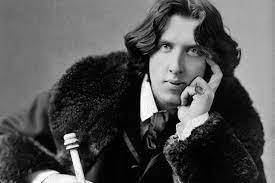
Fue un escritor, poeta y dramaturgo de origen irlandés nacido en Dublín en octubre de 1854.
Wilde es considerado uno de los dramaturgos más destacados del Londres victoriano tardío.
Fue el segundo de tres hijos del matrimonio conformado por Sir William Wide un importante cirujano especialista en otología y oftalmología de Irlanda, y ademas un destacado arqueólogo y estadístico, y de Jane Frances Agnes Elgee, poetiza partidaria del nacionalismo irlandes. Ambos, destacados miembros de la sociedad angloirlandesa de Dublín.
Su educación transcurrió en casa hasta la edad de 9 años, demostrando una facilidad especial para el francés y el alemán, además de ser poseedor de una inteligencia notable. En 1871 ingresó al Trinity College de Dublín en donde estudió a los clásicos durante 3 años. Fue allí en donde conocería a su tutor quien inspiró su interés por la literatura griega.
En 1874 ingresó en el Magdalen College de Oxford, continuando sus estudios hasta 1878, en donde se licenció con reconocimientos en estudios clásicos.
En 1881 a los 27 años, publicó su primer libro con trabajos poéticos el cual recibió buena aceptación.
En 1884, contrajo matrimonio con Constance Lloyd quien le dió dos hijos.
En 1878 abandona su país para pasar los siguientes seis años en Paris, Londres y los Estados Unidos dando conferencias.
Wilde recibió una gran influencia de escritores como John Ruskin y Walter Pater, además de adherirse al movimiento estético o esteticismo, basado en la doctrina de que el arte sirve para beneficio de la exaltación de la belleza, en donde Wilde fue uno de sus principales representantes en Gran Bretaña.
En 1895, cuando se encontraba en la cima de su carrera, Wilde protagonizó uno de los escándalos mas sonados de su tiempo al ser acusado de “sodomía y de grave indecencia”, por el padre de quien fuera su amigo lord Alfred Douglas, siendo condenado a dos años de trabajos forzados.
La sentencia a Wilde que buscaba ser ejemplificadora, tuvo mucha repercusión y propició el recrudecimiento de la intolerancia sexual en Gran Bretaña y en todo Europa.
Desengañado con la sociedad inglesa y arruinado material y espiritualmente, abandonó la prisión en mayo de 1897, retomando su amistad con Douglas ante la desaprobación de ambas familias, en donde la esposa de Wilde, rehuso volver a encontrarse con el y le prohibió ver a sus hijos. Wilde y Douglas vivieron algunos meses juntos cerca de Nápoles, hasta que la amenaza de sus respectivas familias de cortarles los fondos terminó por separarlos.
Wilde pasó los últimos años de su vida en Paris, bajo el nombre falso de Sebastián Melmoth, muriendo a la edad de 46 años en septiembre de 1900.
Fuentes: Wikipedia y biografiasyvidas.com
#frases#citas de la vida#citas celebres#citas de escritores#poetas#poesia#frases de la vida#oscar wilde#pensadores#pensamientos aleatorios
27 notes
·
View notes